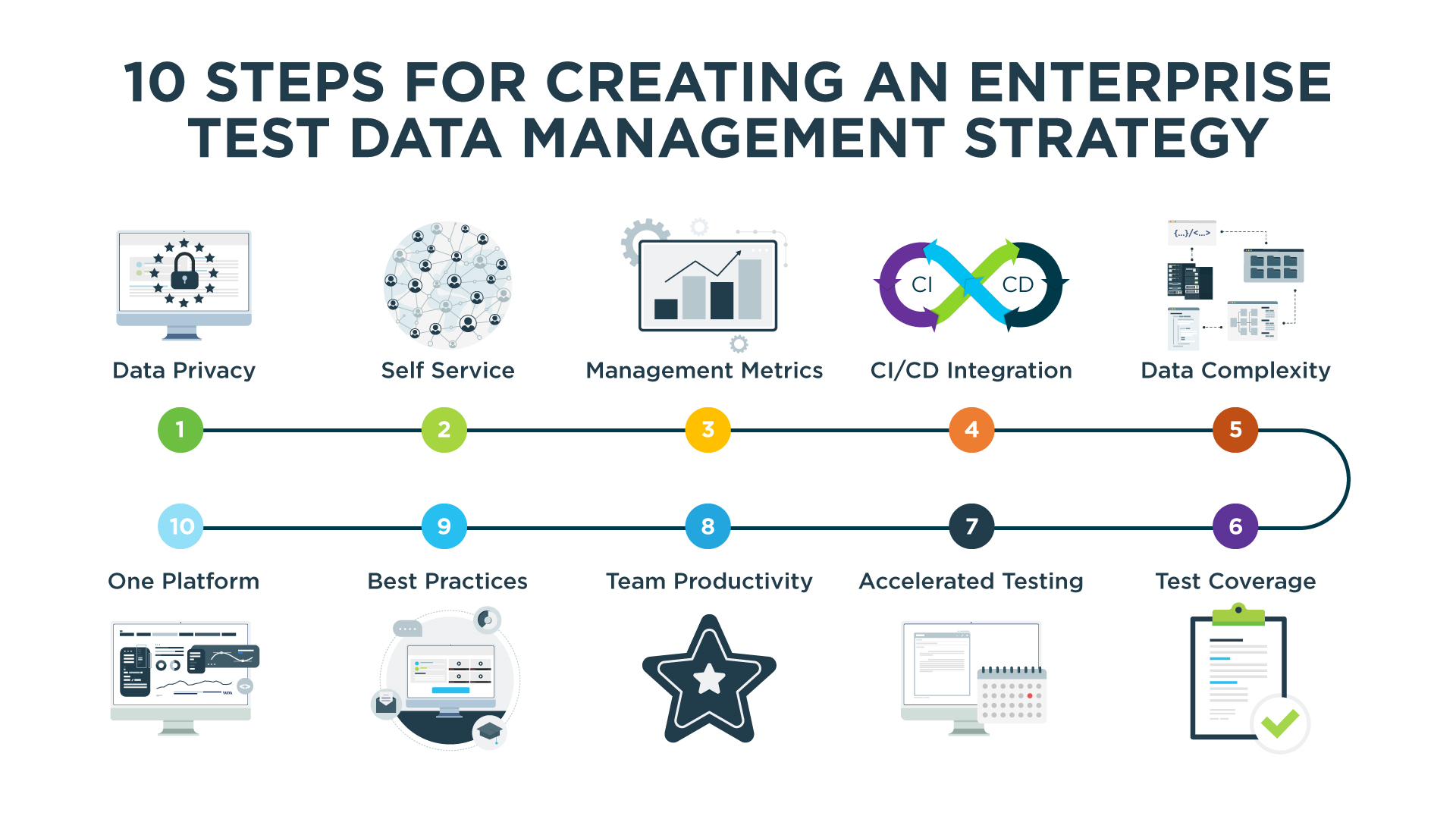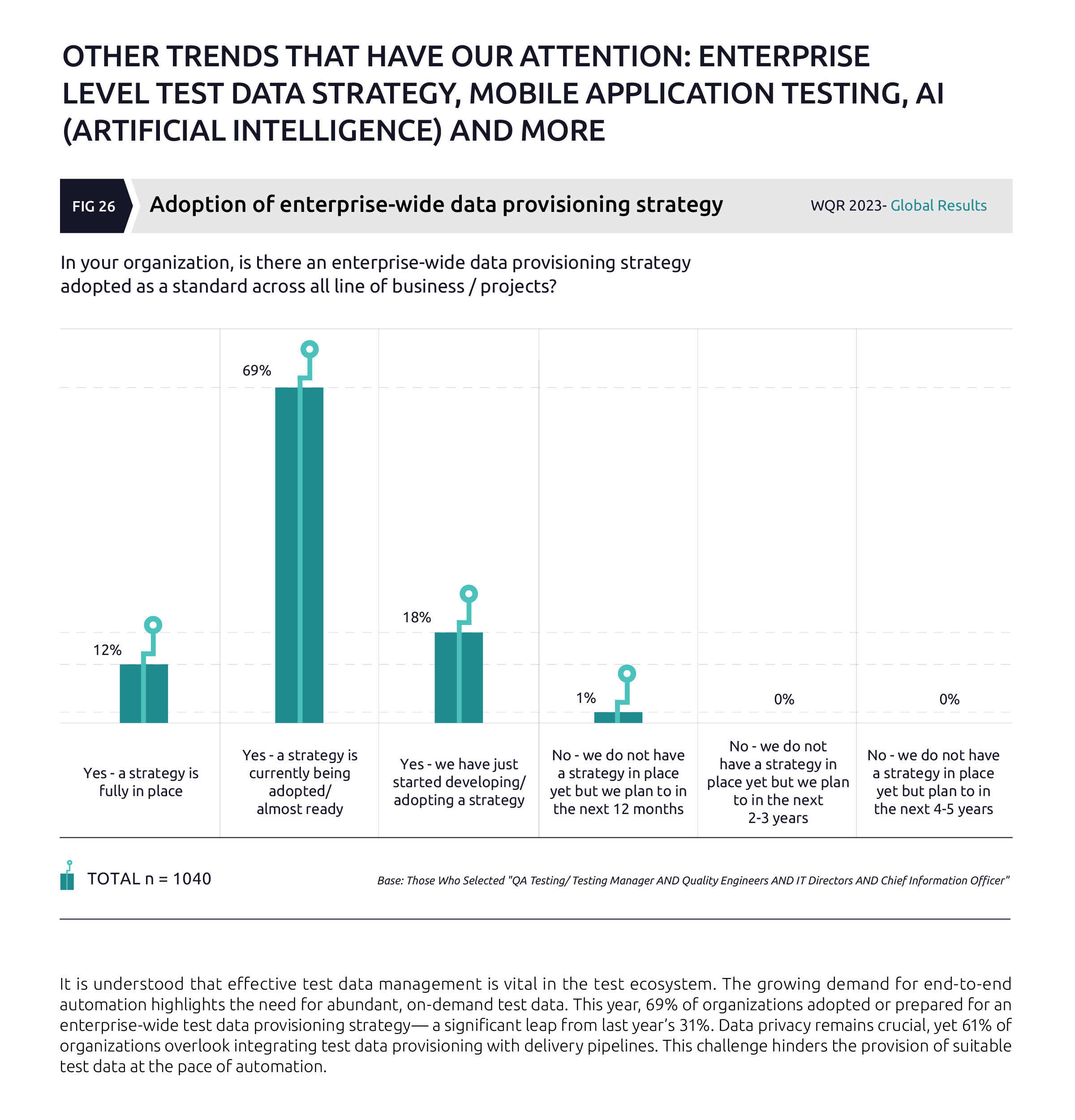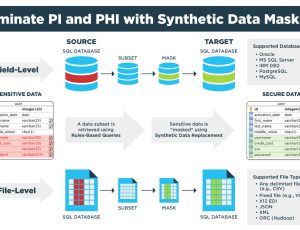
10 Steps for Creating an Enterprise Test Data Management Strategy
Leveraging Synthetic Data, Automation & Best Practices to Enhance Quality & Efficiency

Introduction: How to Implement an Effective Enterprise Test Data Management Strategy
As the pace of digital transformation accelerates, organizations face mounting pressure to deliver high-quality software faster than ever before. A critical factor in meeting these demands is implementing an effective enterprise-wide data provisioning strategy. The recently released 15th edition of the World Quality Report (WQR) provides valuable insights into the state of data provisioning and the key trends shaping its future.
According to the WQR, a majority of organizations either have an enterprise data provisioning strategy in place or are in the process of adopting one. This underscores the growing recognition of data provisioning’s crucial role in enabling quality and efficiency at scale. However, developing and executing such a strategy is no simple undertaking. It requires careful consideration of multiple factors, from data privacy and compliance to automation and integration with continuous integration and continuous delivery/deployment (CI/CD) pipelines.

In this article, we’ll explore 10 essential elements of an effective enterprise data provisioning strategy, drawing on findings from the WQR and best practices from industry leaders. Whether you’re a CIO, quality assurance leader, or software development manager, these insights will help guide your organization’s approach to data provisioning for optimal results.

1. Prioritize Data Privacy and Compliance in Software Testing with Synthetic Test Data
With the proliferation of data privacy regulations like GDPR and CCPA, ensuring compliance is a top concern for any data provisioning strategy. Leading organizations are turning to synthetic data generation as a way to mitigate risk. Synthetic data allows organizations to design the test data they need to precisely test their business algorithms while safeguarding privacy.
Masked production data and secure test environments are also key components of a compliant data provisioning approach. By implementing robust security measures and strictly controlling access to sensitive data, organizations can minimize the potential for breaches and violations.
The GenRocket Solution: Replace sensitive production data with controlled and conditioned synthetic data that is generated on-demand and in real-time during automated testing. Gradually replace the use of production data with synthetic data to eliminate the use of all sensitive data from a lower environment. This will ensure total compliance with all data privacy laws. Learn More

2. Enable Distributed Self-Service Access: Empower Agile Teams with Self-Service Test Data Management
As more companies embrace global delivery models and remote work, enabling teams to access the data they need quickly and easily is critical. A modern data provisioning strategy should prioritize simple, self-service access to data for teams spread across geographies and time zones.
Centralizing data modeling and test data management while providing distributed access helps strike the right balance between governance and agility. Teams can rapidly provision the data required for their specific testing needs without heavy reliance on a centralized QA function.
The GenRocket Solution: Create a small and elite team of synthetic data experts in a Center or Community of Excellence (CoE). First, allow users (developers, testers, data scientists) to request any blend of production or synthetic data through GenRocket’s distributed self service portal. Their requests are captured as reusable “Test Data Cases” that can be executed directly in the CI/CD pipeline. Second, provide a utility (we call it G-Questionnaire) that allows users to modify the Test Data Cases and create their own Test Data Cases with different permutations and combinations of test data. Learn More

3. Implement Metrics for Continuous Improvement: Measuring Success for Continuous Improvement with Test Data Management Metrics
To optimize data provisioning processes over time, establishing clear metrics is a must. Tracking key indicators such as test coverage, cycle time, and team productivity provides the visibility needed to identify bottlenecks and drive continuous improvement.
Organizations with mature data provisioning practices are more likely to have implemented comprehensive metrics programs. By using data to inform decision making, these organizations can fine-tune their strategies and stay ahead of the curve.
The GenRocket Solution: Monitor the use of Test Data Cases by dev and test teams to identify strategies for accelerated test cycle and greater test coverage. Track the pace of adoption and areas where greater utilization of the data provisioning platform can be achieved. GenRocket has developed a comprehensive deployment guidebook to manage and measure the pace of TDA technology adoption. Learn More

4. Automate Data Provisioning and Integrate with CI/CD: Integrating Automated Test Data Generation into CI/CD Pipelines
Speed and agility are essential in today’s fast-moving development environments. Automating the data provisioning process and integrating it seamlessly into continuous integration and continuous delivery/deployment (CI/CD) pipelines allows teams to access the data they need on-demand, without manual intervention.
There is a strong correlation between organizations’ adoption of CI/CD and their data provisioning maturity. By leveraging tools that enable data provisioning to be triggered as part of automated build-deploy-test workflows, these organizations can accelerate testing and increase efficiency.
The GenRocket Solution: Integrate the deployment of the GenRocket platform with any development tool or testing framework to fully automate the release pipeline. Any DevOps tool can make API calls to the GenRocket Runtime Engine to trigger the generation of synthetic data or the subsetting and masking of production data for immediate use for any category of automated testing. Learn More

5. Ensure Coverage for Complex Data Landscapes: Test Data Strategies for Complex Enterprise Data Environments
Most enterprise IT landscapes include a mix of modern cloud-native applications and legacy systems — often built on mainframes. An effective data provisioning strategy must account for these complex environments and ensure adequate test coverage across the stack.
Generating test data that accurately reflects production conditions is critical for assuring the quality of applications that rely on legacy back-end systems or data inputs from external sources. Synthetic data can be especially helpful here, by replicating the relationships and dependencies of data across multiple platforms.
The GenRocket Solution: Leverage more than 100 data formats supported by the GenRocket platform to simulate virtually any data environment including mainframes, web services, SQL, NoSQL, fixed file, message and event data, documents and images, COTS applications and complex data feeds. If your organization as a complex data environment, GenRocket and provide or build a formatting option to reproduce it with synthetic data. Learn More

6. Increase Test Coverage and Boost Quality: Maximizing Test Coverage and Software Quality with Comprehensive Test Datasets
Gaps in test coverage are a leading cause of escaped defects and quality issues. On average, organizations are achieving only 30-50% coverage with their current testing practices. Best-in-class enterprises aim much higher — targeting 80-90%+ coverage.
Increasing test coverage requires an ample supply of quality test data representative of real-world scenarios. A robust data provisioning strategy that leverages techniques like data subsetting, masking, and synthetic generation to produce comprehensive datasets for testing is key to achieving high coverage targets and elevating quality.
The GenRocket Solution: GenRocket has built a library of more than 730 intelligent data generators that can be configured to generate synthetic data in any pattern or set of permutations needed to maximize coverage. This enables positive testing as well as negative testing in addition to edge cases and conditional values for testing business rules and program logic. Learn More

7. Accelerate the Software Development Lifecycle (SDLC): Accelerating Software Delivery Through Faster Test Data Provisioning
In today’s rapid development cycles, provisioning test data is often a major bottleneck. Many organizations need days or even weeks to provision the data required to test a new feature or code change. These delays can significantly hamper speed to market.
Mature data provisioning practices, powered by automation, can slash provisioning time down to a matter of minutes. By eliminating slow, manual processes and enabling testing to occur earlier and more frequently, organizations can dramatically compress their development timelines.
The GenRocket Solution: One of the most immediate benefits GenRocket customers realize is the ability to replace manual data creation with automated synthetic data generation. The use of spreadsheets and python scripts to create the data needed to augment production data can be eliminated with the use of GenRockets robust Test Data Automation (TDA) technology. Learn More

8. Maximize Team Productivity and Efficiency: Boost Software Tester Productivity with Streamlined Test Data Management
Inefficient data provisioning processes don’t just slow testing; they also sap team productivity. Testers and developers waste significant time waiting for data, locating appropriate datasets, or creating test data manually. This is time that could be spent on higher-value testing and development activities.
Streamlining data provisioning through automation and self-service access frees teams from these burdens. Reusable test datasets, easy discovery of relevant assets, and automatic provisioning of sanitized production data all help boost team efficiency and keep testers focused on core testing tasks.
The GenRocket Solution: With TDA, data provisioning is routinely accelerated by 1000% or more. The time saved by replacing manual processes with automation reduces test cycle time and improved coverage reduces defect resolution time. This allows the dev and test team to spend more time on application development and more robust testing. Learn More

9. Invest in Upskilling and Best Practices: Upskilling QA Teams on Test Data Management Best Practices and Tools
As with any IT discipline, getting the most out of data provisioning requires the right mix of tools, processes, and people. Many WQR respondents cited a lack of skills and experience as a top challenge in data provisioning.
Investing in upskilling QA staff is critical to maximize the impact of new data provisioning practices and tools. Training should focus on deepening understanding of the organization’s data landscape, designing effective test plans and data scenarios, and leveraging automation to optimize provisioning tasks. Adopting best practices around test data management, compliance, and metrics is also key.
The GenRocket Solution: By following the GenRocket Methodology to Model, Design, Deploy and Manage your data environment, you will develop a deeper understanding of your data environment and raise the level of quality associated with the dev-test-release process. It only takes a small team of GenRocket experts to support a global community of developers and testers with the precise data needed for any category of testing. Learn More

10. Consolidate on a Single Platform to Reap the Benefits of Unified Enterprise Test Data Provisioning
With test data spread across myriad systems, databases, and applications, consolidating on a unified data provisioning platform can yield major efficiency and cost savings. Organizations using multiple disconnected tools experience higher overhead costs, greater complexity, and slower provisioning speeds.
Standardizing on a single platform enables organizations to streamline training, simplify support, and take full advantage of advanced features like synthetic data generation, automated masking, and self-service access. This translates to a leaner, more agile data provisioning function.
The GenRocket Solution: With the addition of production data subsetting and masking to the industry’s most advanced synthetic data generation technology, GenRocket now provides a single platform for any type of data provisioning requirement. This reduces cost and complexity as it accelerates the provisioning process. GenRocket allows you to gradually replace the use of production data with synthetic data at a pace that matches the needs of your organization. Learn More
Conclusion: Driving Quality and Innovation with a Future-Ready Enterprise Data Provisioning Strategy
As the World Quality Report makes clear, data provisioning is no longer an afterthought — it’s a core enabler of enterprise agility, quality, and efficiency. By thoughtfully developing and executing a comprehensive data provisioning strategy, organizations can position themselves to surmount testing challenges and accelerate their digital transformations.
While there’s no one-size-fits-all approach, prioritizing key elements like data privacy, self-service access, automation, and integration with CI/CD pipelines is essential. So too is accounting for the realities of complex enterprise data environments and investing in the right tools, skills, and best practices.
Synthetic data solutions, like those offered by GenRocket, can be a powerful accelerant for organizations looking to level up their data provisioning capabilities. By providing secure, high-quality test data on-demand, synthetic data platforms help eliminate constraints and empower teams to test faster and more comprehensively.
The future of data provisioning is already coming into focus — and with the right strategy, forward-thinking organizations can position themselves to capitalize on the opportunities ahead. By heeding the insights of the World Quality Report and embracing emerging solutions and practices, enterprises can harness the power of data provisioning to drive quality, accelerate innovation, and secure their competitive advantage for years to come.
Ready to take your enterprise data provisioning strategy to the next level?
GenRocket offers the only synthetic data platform that combines enterprise-class scalability, dynamic data generation, integration with any test environment, and unbeatable value for money.
Trusted by over 50 Forbes Global 2000 companies and top-rated on the G2 Software Marketplace, GenRocket empowers you to automate the design of synthetic data and maximize test coverage with data delivered in any volume, variety, and format.
From realistic and edge case data to complex workflows and machine learning datasets, GenRocket enables you to rapidly deploy high-quality test data across your enterprise. Don’t miss out on the opportunity to slash provisioning time, boost team productivity, and rack up cost savings.
Experience the power of GenRocket today and propel your data provisioning capabilities to new heights!






